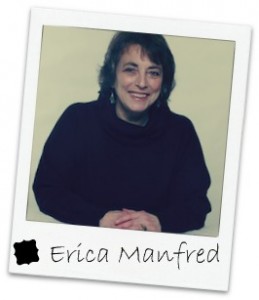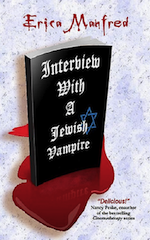 ~ Interview by Melina Kantor
~ Interview by Melina Kantor
* This post is part of Erica Manfred’s Chick Lit Plus Blog Tour.
Until recently, I thought I’d heard (or even experienced) some of the worst JDate horror stories imaginable. Or at least some of the strangest.
Trust me. My friends and I could write books about our online dating experiences without having to stretch the truth even a little.
But then, I learned about poor Rhoda Ginsburg, the “zaftig, middle-aged journalist” from Erica Manfred’s book who falls in love with a vampire she meets on JDate. And he’s not just any vampire. He’s a former Hasadic rabbi who now lives in Crown Heights, Brooklyn and spends a surprising amount of time on eBay.
Oh yeah. He’s gorgeous too.
And well. . . Let’s put it this way. If Rhoda were sitting around a table with me and my single friends while we tried to outdo each other with entertaining JDate stories, she’d totally win.
 As soon as I heard about Interview With a Jewish Vampire, I knew wanted to read it. Being a fellow JDater (and a Buffy fan), how could I not? The story did not disappoint. Interview With a Jewish Vampire is a hilarious book filled with incredibly vivid and quirky characters, such as Charlene, Rhoda’s friend who “looked like Wonder Woman but sounded like Tickle Me Elmo” and Rhoda’s tough, former New York City school teacher mother Fanny.
As soon as I heard about Interview With a Jewish Vampire, I knew wanted to read it. Being a fellow JDater (and a Buffy fan), how could I not? The story did not disappoint. Interview With a Jewish Vampire is a hilarious book filled with incredibly vivid and quirky characters, such as Charlene, Rhoda’s friend who “looked like Wonder Woman but sounded like Tickle Me Elmo” and Rhoda’s tough, former New York City school teacher mother Fanny.
I’m delighted to have Erica here today to tell us more.
Welcome Erica! Thanks for stopping by the blog!
Q. Most authors I know don’t exactly love being asked where they get their ideas, but in this case, I can’t resist asking (forgive me). What sparked the idea for a book about JDate and a Hasidic vampire?
 A: I fell in love with vampires in the 1980’s when I read Interview with a Vampire by Anne Rice. The language, the romanticism, the concept of an entire vampire society who lived for centuries and were cursed with having to kill to live was enthralling. The sexiness of Rice’s vampires also made them irresistible. What red-blooded American fan of paranormal romance doesn’t fantasize about being ravished by Lestat?
A: I fell in love with vampires in the 1980’s when I read Interview with a Vampire by Anne Rice. The language, the romanticism, the concept of an entire vampire society who lived for centuries and were cursed with having to kill to live was enthralling. The sexiness of Rice’s vampires also made them irresistible. What red-blooded American fan of paranormal romance doesn’t fantasize about being ravished by Lestat?
I originally envisioned Interview with a Jewish Vampire as a humorous essay, a funny valentine to Anne Rice’s classic. I imagined the scenario of a Jewish girl meeting a Hasidic vampire on Jdate and interviewing him. He explains that he was a rabbi turned into a vampire by Dracula, an anti-semite, who thought it was a good joke to turn a Hasidic rabbi into a vampire because he’d be forced to drink blood which isn’t kosher. I mentioned the piece to a literary agent who repped a lot of paranormal novels at a journalist’s conference and she got very enthusiastic and told me to turn it into a novel. I sat on that idea for a while, too long a while as it happened. I wrote the novel with the encouragement of my writer’s critique group, but by the time I finished it, the same agent refused to look at it because she’d decided she wanted to move on. She didn’t want to be identified as the agent who only represents vampire novels anymore.
With my usual finger on the pulse of the market, I tried to sell Interview with a Jewish Vampire just when editors had decided that the vampire craze was over. Never mind that my book was a parody of vampire romances with a Jewish twist, which gave it a fresh take on the genre. If the publishing world has declared vampires over, they cannot be resuscitated except maybe by Anne Rice, who invented the genre and whose fans would buy the phone book if it had her name on it. But even Anne herself has moved on from Lestat and her other vampires. She’s dabbled in angels and is now writing about werewolves, for God’s sake. If even Anne, the mother of all vampires, has deserted us what hope is left?
Q: You describe yourself as a “self-publishing guru.” What is your top piece of advice for writers considering self-publishing their work?
A. Do it for love, not for money. Only the very smart and lucky few actually make money self publishing. That doesn’t mean it’s not worth it however.
Q. What are some of the challenges of writing non-fiction in addition to your novels? Is it difficult to make the switch?
A. Yes, actually it is. I write non-fiction for a living, I still do. I’m primarily a health writer. I write fiction for love and it’s hard doing both because I have to focus on the money-making side. I feel like I should be out there pitching editors for new work, not writing about Jewish vampires.
Q. Can you tell us a bit about your current projects?
A. I’m planning to write a sequel to Interview With a Jewish Vampire, called “True Kosher Blood.” And I’m publishing another book on Kindle, a mystery called “Get Off My Case, A Norma Katzman, detective, mystery.”
Thank you Erica. I’m looking forward to “True Kosher Blood!”
Erica Manfred is a freelance journalist, humorous essayist, and author. Her most recent book is the novel, Interview with a Jewish Vampire. She’s also authored two non-fiction self-help books, including most recently He’s History You’re Not; Surviving Divorce After Forty. Her articles and essays have appeared in Cosmopolitan, The New York Times Magazine, Ms., New Age Journal, Village Voice, Woman’s Day, SELF, Ladies Home Journal, and many other publications. Erica lives in Woodstock, New York with her Chihuahua, Shadow, and her daughter, Freda. Brought up by Jewish parents who spoke Yiddish but avoided religion, she got her Jewish education at the Woodstock Jewish Congregation which welcomes Jews from all backgrounds, from atheist to Orthodox, to vampire. Her website is www.ericamanfred.com, or visit www.jewishvampire.com

